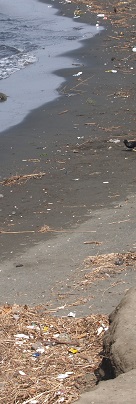COURSE STRUCTURE AND LESSON CONTENT
 There are 8 lessons in this course:
There are 8 lessons in this course:
- Introduction to Environmental Chemistry and Chemistry Concepts
- Chemistry
- Environmental chemistry through time
- Global warming, greenhouse gases and carbon sequestering
- Basic chemistry concepts
- Charges on Atoms and Bonds
- Compounds
- Organic and Inorganic Compounds and Biochemistry used in Environmental Chemistry
- Ecological concepts in the environment
- Pollutants in the environment
- Degradation of pollutants
- Pricing measures implemented by government policy makers
- Types of pollutants
- Contaminants in the world's natural environments (biomes)
- Air and Environmental Chemistry
- Composition of the atmosphere
- Vertical structure of the atmosphere
- Purpose of the atmosphere
- Air pollution and its source
- Effects of air pollution
- Climate change
- Reducing carbon and greenhouse gas emissions
- Water and Environmental Chemistry
- Hydrological Cycles
- Marine (Ocean) Environments
- Coastal Environments
- Continental and Inland Water Environments
- Water chemistry – important reactions
- Water categories and classifications
- Water and impurities and pollutants
- Water quality standards
- Water pollution management
- Methods of water treatment
- Soil and Environmental Chemistry
- The nature of soil
- Soil properties
- Important soil chemical reactions
- Soil chemistry and its importance in management
- Soil pollution
- Methods of soil remediation
- Bioremediation
- Environmental Chemistry and Health
- Environmental health as policy
- Specific health risks
- Environmental health levels
- Indoor and Outdoor air pollution
- Water pollutants and health
- Chemicals in households
- Biological controls, pitfalls and positives
- Creating green areas and raising public awareness
- Testing for Environmental Chemistry
- Introduction to sampling and testing
- Sampling design
- Sampling equipment
- Gas/air, soil and water sampling
- Agricultural produce/plant tissue sampling
- Using the correct sample container
- Chain of custody
- Chemical analysis in the field
- Simple colorimetric tests and simple meters
- Chemical analysis in the laboratory
- Applications for Environmental Chemistry
- Environmental assessment and management
- Principles of sustainable environmental management
- Green chemistry in environmental management
- Green chemistry is the future of environmental protection
- Environmental building practices
- Treating contamination or pollution sustainably
- Urban planning concerns and considerations
- Sustainable transport
- Barriers to sustainability and green design
Each lesson is completed with an assignment for you to undertake. You will then submit this to the school for marking by your tutor. Your tutor will return this to with their evaluation and comments relating specifically to your work, and with any suggestions for further research or areas where they consider your work/knowledge would benefit from improvement.
Understand Pollutants in the Environment
Chemical-based products are found in almost every aspect of everyday life. These range from electronic components in our cell phones and appliances, through kitchen, beauty and medical products, clothing and shoes, furniture and building materials to chemicals used in farming, industry and mining. When these products are used or discarded, they can change chemical form, often to a simpler chemical form (i.e. they degrade) or they can remain as is. Many do not degrade, or they degrade to other toxic substances, thus causing problems.
There are possibly 100,000 different chemical substances currently on the market worldwide, often in amounts exceeding tens of tonnes. In consequence, a very wide range of chemicals are present in the atmosphere, geosphere, biosphere and hydrosphere.
It is estimated that between 1 - 3 per cent of these chemicals are problematical in the environment. These environmentally relevant pollutants include heavy metals such as lead and mercury, which are released into the environment by the burning of oil, mining activities, and industrial emissions and effluents. Persistent organic pollutants (known as POPs) often from pesticides, are another problematic substance category.
Why are Pollutants Detrimental?
Pollutants can have harmful effects in the environment because they:
- Can be persistent (they remain in the environment for long periods of time, and do not degrade or break down easily). They upset the natural ecological balance for extended periods.
- Bioaccumulate (they can build up in the bodies of organisms over time, sometimes in fat layers, and they can be spread via the food chain). This can lead to health issues as the pollutant exceeds safe levels.
- Biomagnify (they are cumulative in concentration as they move up the food chain from smaller to larger organisms).
- Can be Toxic (in organisms, they can kill, cause cancer, damage the nervous system, affect the reproductive system , alter hormones etc.).
WHAT NEXT?
To be successful in environmental studies, you need passion, persistence and a willingness to do whatever it takes to succeed.
If this describes you, we can help you to get a start.
You need to build a foundation first, to understand the science that underpins environmental health.
This course could assist you working in the following industries:
- Agriculture
- Local council
- Environmental protection
- Conservation
- Fisheries
- Biosecurity
- Land management and forestry
- Military
Do you have any questions?
If you have any questions about our courses and want to know more, or need advice in choosing a course, please get in touch with us today. You can phone us on (UK) 01384 442752 or (International) +44 (0) 1384 44272 or connect with our specialist tutors using our FREE COURSE COUNSELLING SERVICE.
- You can enrol on our courses at any time.
- You can study from anywhere in the world.
- You study at your own pace.
- You have unlimited access to your tutor whilst you study with us.